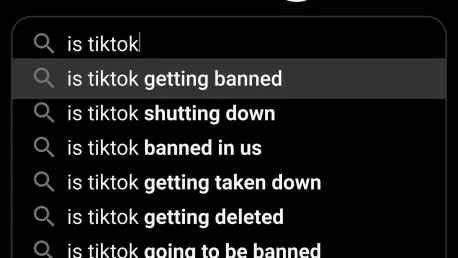With a looming ban on TikTok in the United States, several creators from New Hampshire are actively seeking backup plans to safeguard their content and follower engagement. This assemblage of narratives from different users reveals the profound impact of TikTok on their personal and professional lives, their contingency plans, and their views on the potential ban.
The Uncertainty of TikTok’s Future
Legislative Challenges and Legal Battles
Central to the article is the uncertainty surrounding TikTok’s future in the U.S., driven by legislation requiring ByteDance, the Chinese parent company, to find a new owner for its American operations by January 19. The failure to comply could result in the app being shut down, a scenario currently being contested by TikTok as unconstitutional, with the Supreme Court’s intervention pending. The legislative push has significantly added to the stress of creators who rely on TikTok for their livelihood and social influence. They now face the possibility of having to abandon something into which they have invested considerable time and effort.
If the ban takes place, it could result in career disruptions for many TikTok influencers and content creators. The anxiety is palpable as creators question the future of their work and the potential disruption to their digital communities. Such a sweeping change would force them to rapidly adapt, potentially losing traction, followers, and revenue streams. The legal battles are a race against time, with creators fervently hoping for a resolution that allows them to continue leveraging the platform that has become integral to their lives and businesses.
Impact on Creators’ Lives
Different TikTok creators elaborate on how they utilize the platform and the significant role it plays. Sarah Jones, an art teacher from Portsmouth, offers insights into how TikTok helped her connect with her students and a broader community during the pandemic’s remote teaching phase. Her engaging video content, which features and celebrates student artwork, not only brought joy but also amassed a dedicated following. Her TikTok stardom even led to an appearance on The Kelly Clarkson Show and a successful fundraising effort for a colleague. The connections and opportunities that TikTok has afforded her surpass just social media engagement, extending into real-world impact.
Sarah’s experience illustrates the unique opportunities that TikTok provides, especially for educators and other professionals looking for innovative ways to reach their audience. The platform’s algorithm promotes a level of organic reach rarely matched by its competitors, making it a fertile ground for viral success. Despite potential shutdowns, content creators like Sarah are determined to find ways to sustain their content and continue their outreach endeavors, showcasing resilience amid uncertainty.
Exploring Alternative Platforms
YouTube as a Contingency Plan
Despite her efforts to migrate her content to YouTube, Jones recognizes the unique, fast-paced, and real-time engagement that TikTok provides. She expresses concerns over alternative platforms, specifically regarding the reliability and user experience of Meta-owned sites. YouTube, while a robust platform with a vast user base, lacks the immediate and algorithm-driven virality that TikTok users are accustomed to. Creators worry that their content might not receive the same rapid engagement and that building a new audience from scratch could impose a significant challenge.
Moreover, the culture and format of TikTok are distinct, offering short-form, engaging videos that quickly capture attention. YouTube, known for longer-form content, might force creators to adjust their content strategies fundamentally. The transition to YouTube as a contingency plan, though a practical move, involves rethinking and restructuring content to fit a different type of audience engagement and consumption. It’s a concerning prospect, presenting a strategic hurdle for creators used to TikTok’s dynamic pace.
Instagram and Other Platforms
Meanwhile, environmental advocate Doria Brown from Nashua shares her story of cultivating an international audience on TikTok with content centered on sustainability and climate resilience. Brown is actively seeking legislative intervention to delay the ban. She highlights the potential for TikTok to support underrepresented content creators, citing the 2021 strike by Black creators like herself who sought recognition for their contributions to the platform. Her advocacy efforts demonstrate how TikTok serves as a pivotal stage for voices that might otherwise be marginalized, providing a platform for activism and outreach.
Through TikTok, Brown has secured sponsorships and advanced her advocacy for social justice and environmental issues. She values TikTok’s distinct capabilities for community building and real-time news dissemination. If the ban proceeds, Brown plans to leverage her Instagram presence further and potentially expand to YouTube, but she believes the authentic connection and outreach experienced on TikTok will be hard to replicate elsewhere. The integration of activism with content creation on TikTok has set a precedence that other platforms may struggle to emulate.
The Role of TikTok in Advocacy and Business
Sponsorships and Social Justice
Through TikTok, Brown has secured sponsorships and advanced her advocacy for social justice and environmental issues. She values TikTok’s distinct capabilities for community building and real-time news dissemination. If the ban proceeds, Brown plans to leverage her Instagram presence further and potentially expand to YouTube, but she believes the authentic connection and outreach experienced on TikTok will be hard to replicate elsewhere. This platform’s unique algorithms and community engagement tools have played a significant role in amplifying her message to a broader audience.
For advocacy, TikTok functions not just as a social media app but as an information dissemination tool that reaches a global audience instantaneously. Brown’s story illustrates how the app has become more than just entertainment; it’s a vital instrument for promoting critical issues and securing real-world outcomes. The transition to other platforms might necessitate new strategies, but the inherent connectivity offered by TikTok will remain a reference point for future digital advocacy efforts.
Real Estate Marketing Strategies
Kristin Reyes, a real estate agent, discusses her strategic use of TikTok to expand her business reach. Reyes’s informal, engaging walkthroughs of properties draw more attention than traditional high-resolution content. TikTok’s algorithm and culture have proven more favorable to her business. With several closed deals attributed to TikTok leads, Reyes acknowledges the significant role the platform plays in her marketing strategy. The organic reach and user engagement on TikTok offer an unparalleled advantage compared to other social media sites, fostering direct interaction with potential clients.
Reyes is exploring other platforms like Xiaohongshu or RedNote despite knowing that these, too, face scrutiny due to their Chinese ownership. The feasibility of replicating her success on platforms with different cultural dynamics and user engagement metrics remains uncertain. Not just for real estate, but for numerous industries, TikTok has become an essential part of digital marketing strategies. The potential ban could push professionals like Reyes to innovate and find new ways to connect with their audience, although it won’t be without its setbacks.
Challenges of Transitioning to New Platforms
Viability and User Experience
Common themes emerged from these conversations: the unique, rapid, and wide-reaching engagement TikTok provides, its impact on personal and professional lives, the challenge of replicating this success on other platforms, and the significant role it plays in building supportive and interactive communities. Moreover, the potential ban is seen as a loss of a powerful medium for free expression, knowledge-sharing, and real-time, unfiltered content discovery. Diverse voices have flourished on TikTok, fostering environments that encourage authenticity and creativity in ways that might be stifled on more traditional platforms.
Creators express concerns over the viability and user experience of alternative platforms, such as reliability issues and how supportive these platforms are of content creators’ unique needs. With TikTok, the seamless engagement and content-sharing features have become second nature to its users, something that’s hard to duplicate on other platforms. As creators brainstorm new ways to engage their audiences, there’s an underlying doubt about whether any platform can match TikTok’s level of intuitive and user-friendly engagement.
Ethical Considerations
Concerns about alternative platforms’ viability and ethical considerations regarding support for major companies like Meta also stand out. For these individuals and potentially many more, TikTok offers an unparalleled blend of connectivity, outreach, community building, and professional opportunities — elements that are irreplaceably interwoven with their daily experiences. The ethical implications of shifting to other major platforms involve supporting businesses that might not align with their values, creating a dilemma for many content creators. Constructing a digital brand around ethically complicated platforms can indirectly impact their reputation and follower trust.
TikTok has facilitated a relatively independent space for content creators to thrive, an aspect valued deeply by users. The lack of control or influence from corporate giants makes it a unique attraction. As creators debate their next steps, there is a distinct divide in preferences for platforms that offer similar freedom and lack of heavy-handedness. The decision to switch platforms involves not just a practical consideration but a moral and ethical one as well, complicating the already daunting transition process.
The Future of Digital Engagement
Seeking New Digital Terrains
With the potential ban on TikTok in the United States, numerous creators from New Hampshire are actively exploring alternative strategies to protect their content and maintain follower engagement. These creators have found TikTok to be significantly impactful on both their personal and professional lives, and they are now developing contingency plans to navigate the uncertain future. Some are considering transitioning to other social media platforms like Instagram, YouTube, or emerging apps to ensure they continue to reach their audience. The possible TikTok ban has prompted a mix of concern and proactive measures, reflecting the app’s importance in modern digital culture. This collection of stories from various users highlights how deeply TikTok has woven itself into their routines and careers. Their reflections underscore the anxiety and strategic considerations accompanying the looming restrictions, showcasing their determination to sustain their online presence and engagement despite potential upcoming challenges.









